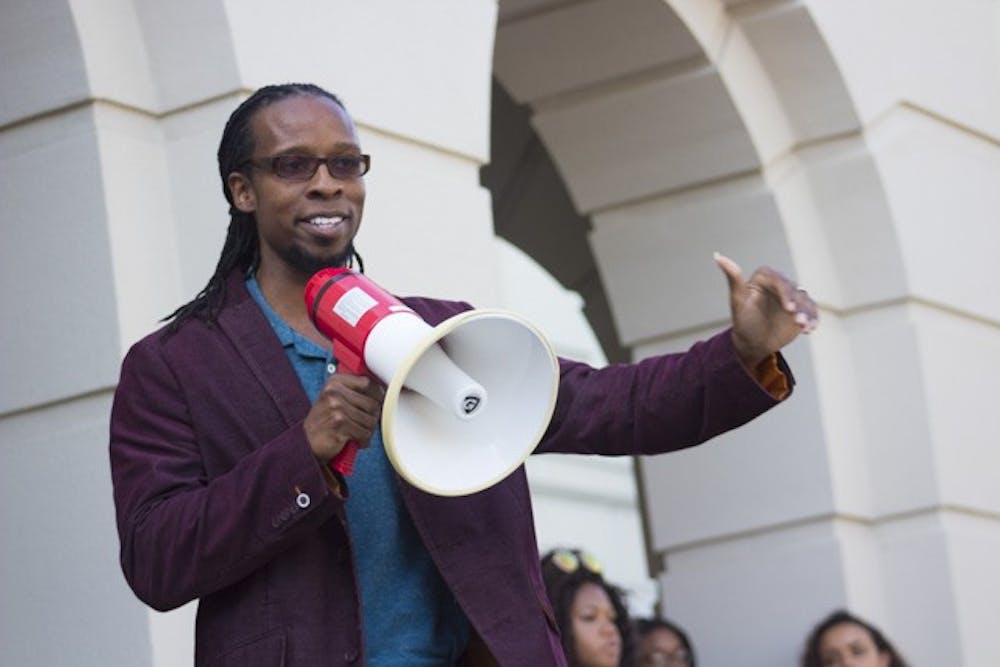Before someone hung Confederate flags on bulletin boards across American University’s campus in late September, professor Ibram X. Kendi was already on a mission to fight racism.
That same night, Kendi spoke to AU, with University President Sylvia Burwell in attendance, about the future of the new Anti-Racist Policy and Research Center, which he founded this semester.
“It is an honor to stand with you on the right side of history … or should we be kneeling?” Kendi joked, kicking off his talk about the center, set to launch in 2018.
The conception of the Center comes at a crucial time for AU and the United States, Kendi said. Most recently, Kendi himself was affected by the Confederate flag incident. One of Kendi’s students spotted a flag poster outside his classroom in the Battelle-Tompkins building and reported it to Public Safety.
“I had to see the emotional reaction and response of students which, of course, left me heartbroken,” Kendi said during a Sept. 27 town hall.
Resistance to hate motivated Kendi to start the Center and strengthened his faith in combating racism. He said he was not deterred by the May hate crime targeting black women and members of Alpha Kappa Alpha Sorority, Incorporated at AU.
“It did not phase me when I understood the context of why it happened,” Kendi said at the town hall. “Why does this keep happening at AU, among these students, these students of color? I started to learn about what these students were doing. What these students were doing was causing people to feel threatened. I actually wanted to be at a place at which people feel threatened by what these black students were doing, by what these students of color were doing.”
Kendi said in an interview that AU recruited him to build a world-class research and policy center that will allow the University “to be the principal place in the world engaged in serious, evidence-based policy-oriented projects” that will shape society. Kendi previously taught at the University of Florida and wrote the award-winning book, “Stamped from the Beginning: The Definitive History of Racist Ideas in America.”
“There is no other anti-racism center on a college campus in the world,” Kendi said during the town hall. “This was the first campus that was willing to engage in direct anti-racism work. That’s not saying it’s perfect ... but it’s saying something.”
The center will house six teams focused on six different subject areas: education, environment, economy, justice, health and politics. Teams will develop policies in their subject area that would campaign for change. For example, the justice team could create policies that push for gender neutral bathrooms. Kendi hopes to see journalists, policy creators, advocates and others with a variety of skill sets come together to work on the issues at hand.
“These people [will] be able to teach specialized courses that you will be able to take. You will be able to be part of these international and national conversations,” Kendi said during the town hall. “That’s why I came here.”
He also plans to have an AU faculty member lead each team with assistance from graduate and undergraduate student assistants. In 2018, what Kendi calls “year one” of the center, the six teams will focus on researching and creating policies in the fall, before turning toward advocacy in the spring.
Besides research and policy creation, Kendi also wants to create a digital library with resources on racial inequity. He hopes to partner with the Kennedy Political Union to start a high-profile debate series on racial issues with experts from both sides of the political spectrum. He’d like to engage the wider D.C. community with opportunities such as internships for high school students and a racial justice book festival.
Students who attended the presentation, such as sophomores Betty Mfalingundi and Vijittra Puckdee, were inspired by Kendi’s ideas for the Center. They both have high hopes, and believe that it is a necessary step toward combating racism at AU.
“I feel like we [at AU] tend to espouse values that we don’t actually practice and anti-racism is one of them,” Mfalingundi said. “I hope the Anti-Racist Center can work to create more unity, and put pressure on faculty and students to not just be not racist, but also anti-racist.”
Puckdee agreed with Mfalingundi, and said Kendi’s presentation resonated with her, especially when Kendi said that the center aims to produce “knowledge for change’s sake.”
“This center will not sit on the sidelines,” Kendi said during his presentation. “It will be a force of change.”
Aneeta Mathur-Ashton contributed to this story.
This story was originally published in the Oct. 20 print edition of The Eagle.





